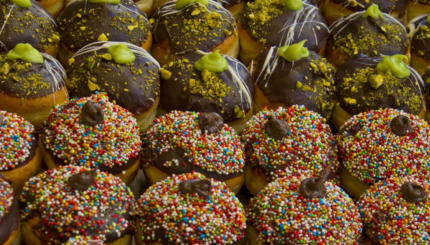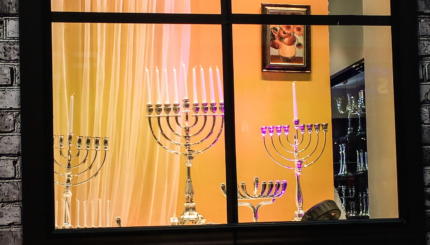About this time last year, I remember walking around the streets of Jerusalem, counting the menorahs I could see in windowsills and doorways. I was excited and inspired—I had never seen such a prevalent, and beautiful, public display of Jewish ritual before.
On Hanukkah, we are told to light the menorah and place it at the entrance to our homes, a place easily visible to those passing by in the street. Over the years, the tradition has changed and many place the menorah in the window, facing the street. The rabbis say that one should choose the window most visible from the street, whether that window is in a bedroom or a family room. If many people pass by the entrance to an apartment (say, in the stairwell), the proper place for the menorah is just outside the entrance to the apartment. All this is to say that the menorah should be positioned in the place where it will be seen by most people, in order to publicize the holiday.
This year, I’m going to place the menorah in my front windowsill of my apartment in Jackson, Mississippi. I’m going to do so without a second thought. I have the privilege of placing a menorah in my windowsill without the fear of persecution in response to this public display of observance. What’s more, I do so with great pride and ownership of the ritual.
This year, next to my menorah, I’m going to place a banner that signifies the meaning of Hanukkah to me, a holiday that’s meant to bring light into our world. As a Jew devoted to social justice, to me that light represents equal rights for all. That light represents my belief that all people, regardless of religion or race or gender, should be able to walk down the street without fear of persecution or violence. Everyone should feel privileged enough to place the equivalent of their menorah in the windowsill.
Over the past weeks, as crowds have gathered across the country to demand an end to police brutality and racial violence, I’ve often wondered what I can do as a Jew and an ally to support this work. So this year, I’m adding a simple object to my windowsill—a sign that reads “Black Lives Matter.” There are similar Hanukkah campaigns and initiatives being encouraged by many national Jewish organizations, such as Bend The Arc and Jewish Social Justice Roundtable.
Hanukkah means “dedication.” This year, I am re-dedicating my Hanukkah. I hope you will join me.
Like this post?
Join the conversation through MyJewishLearning’s weekly blogs newsletter
.
Hanukkah
Pronounced: KHAH-nuh-kah, also ha-new-KAH, an eight-day festival commemorating the Maccabees’ victory over the Greeks and subsequent rededication of the temple. Falls in the Hebrew month of Kislev, which usually corresponds with December.
menorah
Pronounced: muh-NOHR-uh, Origin: Hebrew, a lamp or candelabra, often used to refer to the Hanukkah menorah, or Hanukkiah.



